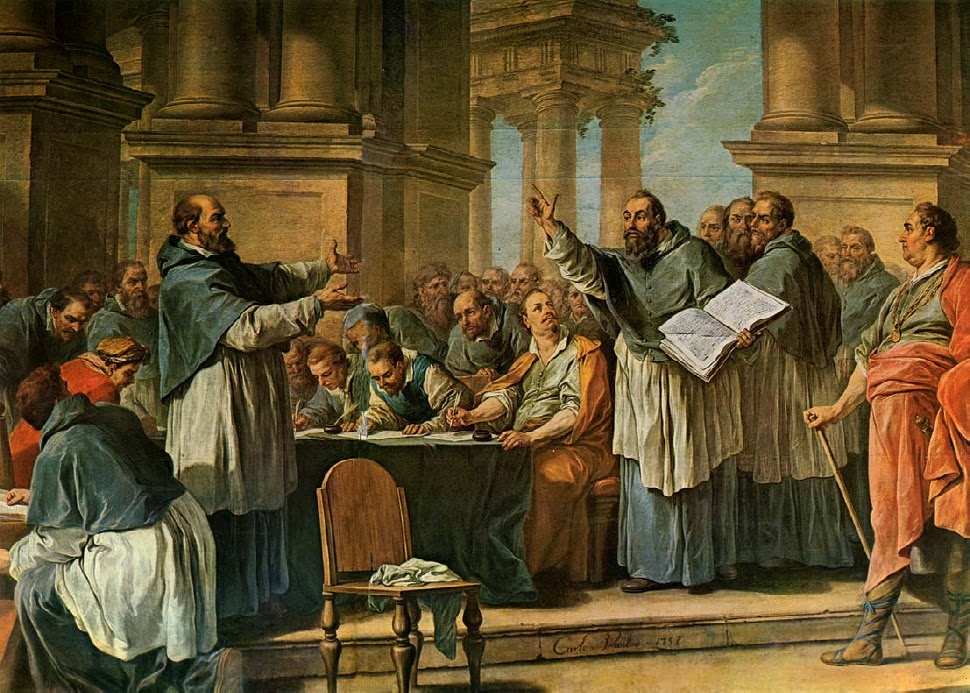|
Macarius (imperial Legate)
Marcarius was an imperial notary sent in 340 to enforce an imperial edict against the Donatist community, in Bagai, Numidia, Roman North Africa. Macarius' mission His original mission had been to distribute donations from the emperor Constans, in North Africa churches in an attempt to end the split between Donatists and Catholics. The local Donatists, however, resisted the legates and aided by Circumcellion groups from the surrounding district, a revolt took place. Rumor spread he had placed imperial images on the Eucharist table and the cry of the rebels was "What has the emperor to do with the church" Optatus records that the Donatists struck first and the retaliation by the soldiers resulted in a slaughter, of the local church groups. A meeting with the Donatists was called, but the legates had the bishops chained and flogged, and some days later the bishops were killed, Donatus of Bagai thrown down a well and Marculus off a cliff. There is some suggestion that this was car ... [...More Info...] [...Related Items...] OR: [Wikipedia] [Google] [Baidu] |
Notary
A notary is a person authorised to perform acts in legal affairs, in particular witnessing signatures on documents. The form that the notarial profession takes varies with local legal systems. A notary, while a legal professional, is distinct from an advocate in that they do not represent the person who engages their services, or act in contentious matters. The Worshipful Company of Scriveners use an old English term for a notary, and are an association of notaries practising in central London since 1373. Overview Documents are notarized to deter fraud and to ensure they are properly executed. An impartial witness (the notary) identifies signers to screen out impostors and to make sure they have entered into agreements knowingly and willingly. Loan documents including deeds, affidavits, contracts, and powers of attorney are very common documents needing notarization. Code of Hammurabi Law 122 (c. 1755–1750 BCE) stipulated that a depositor of gold, silver, or o ... [...More Info...] [...Related Items...] OR: [Wikipedia] [Google] [Baidu] |
Imperial Estate (Roman)
An imperial estate (''patrimonium'' or ''res privata'') in the Roman Empire was the "personal property of members of the imperial family, as distinct from property belonging to the Roman state" (''ager publicus''). On the Emperor's death these properties passed to his successor, and not to his private heirs. Imperial estates were not only farming estates, or ''latifundia'', but also pastures (''saltus'') and mines (''metalla''). Management of imperial estates within a province was the responsibility of a procurator who, in turn, reported to the ''procurator patrimonii'' in Rome. The procurator leased the estate to a ''conductor'', a contractor or administrator. On small estates the conductor might farm the land himself. On larger tracts the conductor sub-let the land to '' coloni'', tenant-farmers. Coloni were free men, and not bound to the land like later serfs. The coloni paid the conductor in shares of their crops, and were also obliged to perform other services a few days a ... [...More Info...] [...Related Items...] OR: [Wikipedia] [Google] [Baidu] |
Schisms In Christianity
A schism ( , , or, less commonly, ) is a division between people, usually belonging to an organization, movement, or religious denomination. The word is most frequently applied to a split in what had previously been a single religious body, such as the Great East–West Schism or the Western Schism. It is also used of a split within a non-religious organization or movement or, more broadly, of a separation between two or more people, be it brothers, friends, lovers, etc. A schismatic is a person who creates or incites schism in an organization or who is a member of a splinter group. Schismatic as an adjective means pertaining to a schism or schisms, or to those ideas, policies, etc. that are thought to lead towards or promote schism. In religion, the charge of schism is distinguished from that of heresy, since the offence of schism concerns not differences of belief or doctrine but promotion of, or the state of division, especially among groups with differing pastoral jurisdict ... [...More Info...] [...Related Items...] OR: [Wikipedia] [Google] [Baidu] |
Numidia (Roman Provinces)
Numidia ( Berber: ''Inumiden''; 202–40 BC) was the ancient kingdom of the Numidians located in northwest Africa, initially comprising the territory that now makes up modern-day Algeria, but later expanding across what is today known as Tunisia, Libya, and some parts of Morocco. The polity was originally divided between the Massylii in the east and the Masaesyli in the west. During the Second Punic War (218–201 BC), Masinissa, king of the Massylii, defeated Syphax of the Masaesyli to unify Numidia into one kingdom. The kingdom began as a sovereign state and later alternated between being a Roman province and a Roman client state. Numidia, at its largest extent, was bordered by Mauretania to the west, at the Moulouya River, Africa Proconsularis to the east, the Mediterranean Sea to the north, and the Sahara to the south. It was one of the first major states in the history of Algeria and the Berbers. History Independence The Greek historians referred to these peoples a ... [...More Info...] [...Related Items...] OR: [Wikipedia] [Google] [Baidu] |


